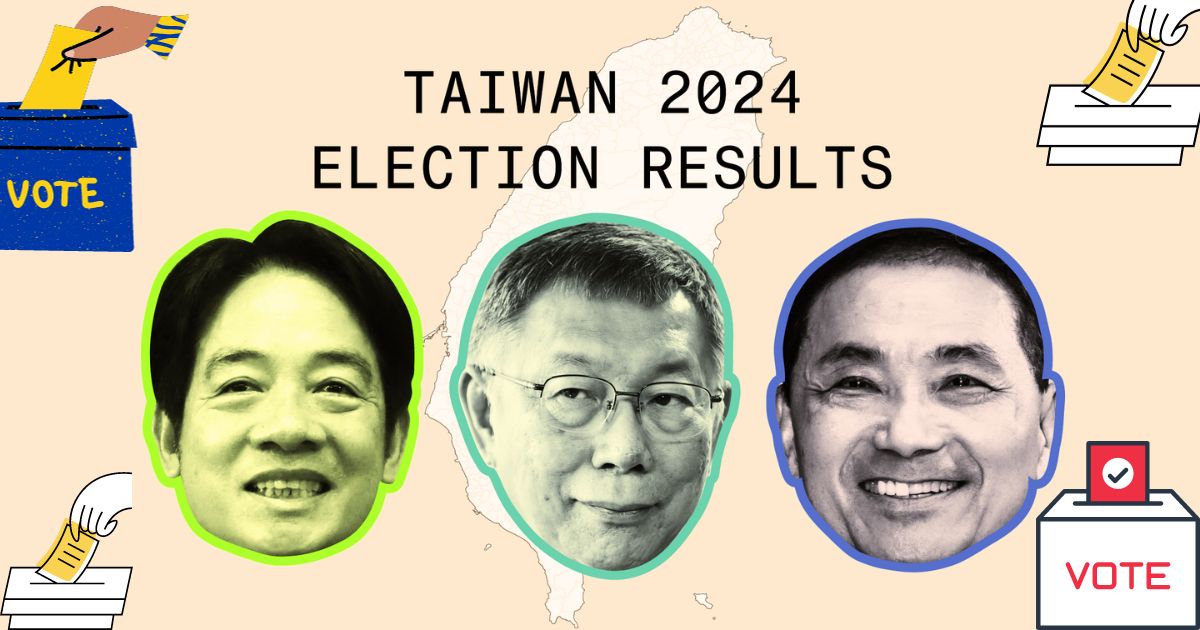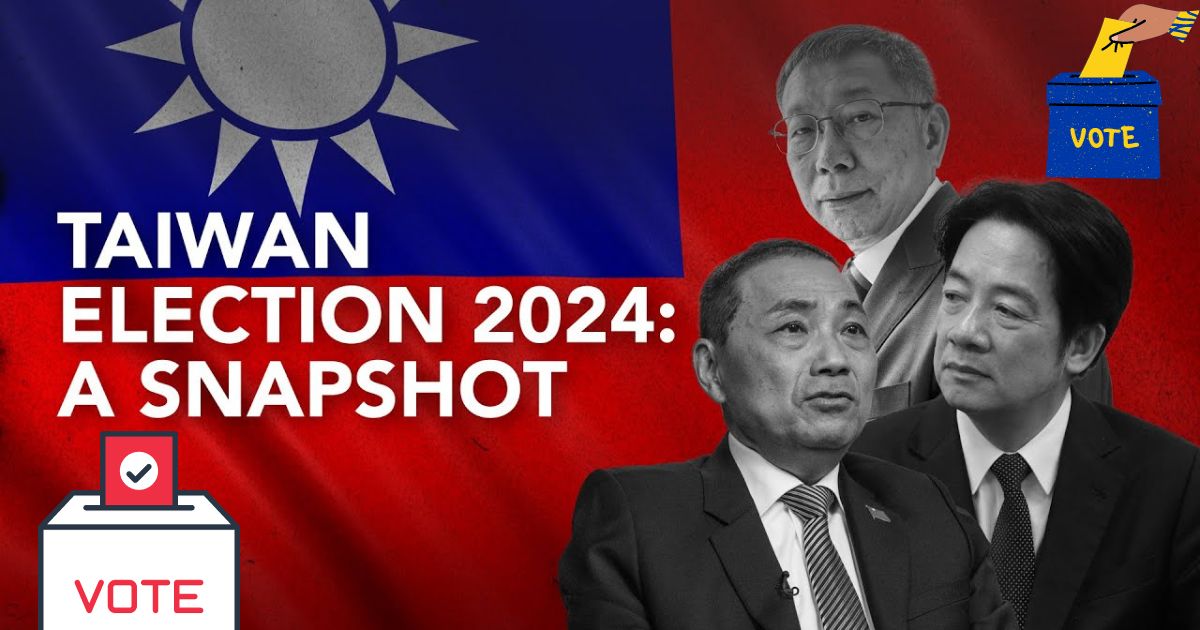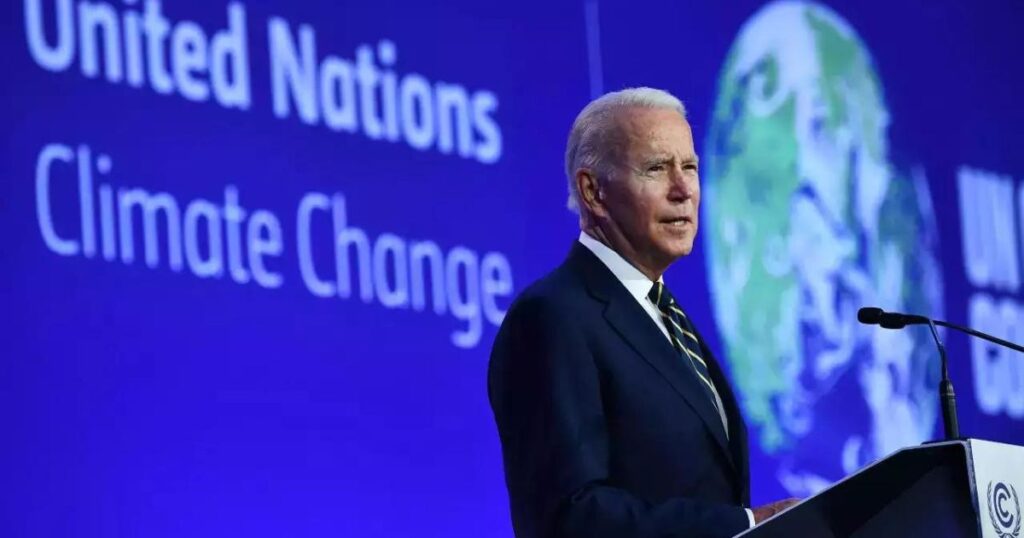Taiwan’s 2024 Election: A Turning Point in Cross-Strait Relations?
On January 13th, 2024, Taiwan held its 8th direct presidential election, marking a significant moment in the island nation’s history. With the incumbent Tsai Ing-wen ineligible for re-election, the contest saw three major candidates vying for the presidency:
- Lai Ching-te (DPP), the incumbent vice president, campaigned on a platform of maintaining Taiwan’s status quo and strengthening its international relations.
- Hou Yu-ih (KMT), the mayor of New Taipei City, advocated for closer economic ties with mainland China and improving cross-strait dialogue.
- Ko Wen-je (TPP), the former mayor of Taipei, promised to focus on domestic issues and pursue a neutral stance vis-à-vis China.

A Close Race with Uncertain Implications:
The election was a tight race, with Lai Ching-te eventually emerging victorious with 40.5% of the vote. Hou Yu-ih followed close behind with 35.5%, while Ko Wen-je captured 23.5%. This outcome suggests a divided electorate, with voters torn between maintaining the current path of independence and seeking closer ties with China.
Key Takeaways and Potential Impact:
- DPP’s continued dominance: Lai Ching-te’s victory marks the third consecutive term for the Democratic Progressive Party (DPP), indicating continued public support for their stance on cross-strait relations.
- Shifting political landscape: The strong showing of the KMT demonstrates a growing desire among some voters for a more conciliatory approach towards China. This could potentially lead to a more nuanced stance on the cross-strait issue in the future.
- Domestic challenges: Lai Ching-te faces the challenge of addressing Taiwan’s immediate concerns, such as the slowing economy and rising inequality. His ability to deliver on these promises will be crucial in maintaining public support.
- Uncertain future for cross-strait relations: While Lai Ching-te has pledged to maintain Taiwan’s status quo, the long-term direction of cross-strait relations remains uncertain. China’s increasingly assertive stance towards Taiwan could pose significant challenges for the new administration.
The 2024 Taiwan election has sent ripples beyond the island nation, raising questions about the future of cross-strait relations and the broader geopolitical landscape in the region.
While only time will tell the full ramifications of this election, it is clear that Taiwan’s political trajectory will continue to be a closely watched topic in the years to come.
By delving deeper into these aspects, you can gain a more nuanced understanding of the Taiwan election and its potential consequences for the future.
The role of the media and social media in the election.: Navigating Taiwan’s 2024 Election
Taiwan’s 2024 election unfolded in a complex digital landscape, where both traditional media and social media played significant roles in shaping public opinion and influencing voter behavior.
Traditional Media:
- Framing the narrative: News outlets, both domestic and international, framed the election through their editorial lens, emphasizing certain narratives over others. This influenced how voters perceived the candidates and their stances on key issues. For example, coverage of cross-strait tensions often dominated headlines, potentially swaying voters towards candidates advocating for specific approaches.
- Balancing perspectives: While some outlets aimed for neutrality, others clearly leaned towards supporting specific candidates or parties. This led to accusations of bias and concerns about misinformation. Finding trustworthy sources became a challenge for voters seeking to make informed decisions.
- Debates and town halls: Live televised debates and town halls provided crucial platforms for candidates to directly address the public and differentiate themselves. However, controlled formats and limited time constraints often restricted in-depth discussions.
Social Media:
- Echo chambers and filter bubbles: Algorithmic personalization on social media platforms created echo chambers where users were primarily exposed to information that reinforced their existing beliefs. This further divided the electorate and limited exposure to diverse perspectives.
- Misinformation and disinformation campaigns: Malicious actors and foreign disinformation campaigns attempted to manipulate public opinion through fake news, propaganda, and deepfakes. This posed a significant challenge for voters seeking accurate information and exacerbated societal tensions.
- Influencer marketing and online communities: Candidates and parties increasingly targeted specific demographics and online communities through social media influencers and targeted advertising. This allowed for more personalized messaging but also raised concerns about undue influence and manipulation.
- Grassroots mobilization and engagement: Social media played a crucial role in mobilizing supporters and organizing campaign events. Platforms like Facebook and Line were instrumental in grassroots movements and voter outreach efforts.
The Impact:
- Increased voter engagement: Both traditional and social media contributed to a higher voter turnout in the 2024 election compared to previous years. This suggests that media played a vital role in raising awareness and encouraging participation.
- Polarization and division: The online environment, with its echo chambers and misinformation campaigns, amplified existing societal divisions and political polarization. This potentially narrowed the space for civil discourse and constructive dialogue.
- Shifting campaign strategies: The importance of social media and digital outreach has forced candidates to adapt their campaign strategies, focusing on targeted online advertising, engaging influencers, and creating compelling online content.
Looking Ahead:
- Fact-checking and media literacy: Combating misinformation and promoting media literacy will be crucial to ensure informed electorate decisions in future elections.
- Regulation and transparency: Social media platforms must be held accountable for their role in facilitating the spread of harmful content and ensuring transparency in political advertising.
- Promoting diverse and balanced narratives: Both traditional and social media outlets have a responsibility to provide diverse perspectives and factual information to facilitate informed public discourse.

The 2024 Taiwan election highlights the increasing complexity of navigating political campaigns in the digital age. Understanding the role of media and social media is crucial for analyzing future elections and ensuring a healthy democratic system.
Navigating Uncharted Waters: The Global Implications of Taiwan’s 2024 Election
The outcome of Taiwan’s 2024 election, with Lai Ching-te’s victory, reverberates beyond the island nation, sending ripples through the global economy and international security landscape. While the full impact remains in flux, analyzing potential scenarios unveils the complexities and challenges facing the world.
Economic Fallout:
- Trade disruptions: Tensions between Taiwan and China, already simmering, could exacerbate, potentially leading to trade disruptions. China, Taiwan’s largest trading partner, could impose economic sanctions or reduce investment, impacting global supply chains and international markets.
- Tech tremors: Taiwan’s semiconductor industry, a critical cog in the global tech sector, could be caught in the crossfire. Supply chain disruptions or disruptions in research and development could have cascading effects on the global electronics industry, raising prices and impacting consumers.
- Investor jitters: Increased uncertainty surrounding cross-strait relations could spook investors, leading to capital flight from Taiwan and the region. This could dampen economic growth and financial stability in East Asia and beyond.
Security Concerns:
- Military escalation: Any perceived shift towards Taiwan independence from the Lai Ching-te administration could be met with increased military assertiveness from China. This could include escalated maneuvers near the island, raising the risk of accidental clashes or unintentional escalation.
- Regional instability: A potential conflict between China and Taiwan would have devastating regional and global consequences. It could disrupt critical shipping lanes, destabilize regional economies, and trigger a broader military conflict involving the United States and other allies.
- Nuclear shadow: While an all-out war employing nuclear weapons remains unlikely, the possibility cannot be fully discounted. The potential use of nuclear weapons in such a conflict would be catastrophic, inflicting unimaginable human and environmental damage.
Global Responses:
- Diplomatic tightrope walk: The international community, led by the United States, will face a delicate balancing act. Maintaining support for Taiwan’s democratic future while navigating China’s sensitivities will be critical in defusing tensions and preventing escalation.
- Economic decoupling: Concerns about China’s assertiveness and potential disruptions to supply chains could accelerate efforts to diversify global trade and reduce dependence on Chinese manufacturing. This could have long-term economic repercussions for China and the global economy.
- Security partnerships: Strengthening alliances and security partnerships in the Indo-Pacific region will be crucial in deterring conflict and promoting regional stability. The role of the United States in bolstering Taiwan’s defenses and reassuring allies will be critical.
Outlook:
Taiwan’s 2024 election has presented the world with a complex geopolitical puzzle. While the potential for economic and security disruptions is real, proactive diplomacy, economic diversification, and robust security partnerships offer pathways towards de-escalation and stability.
Navigating this complex landscape will require careful diplomacy, clear communication, and a resolute commitment to upholding international law and peaceful resolution of disputes.
Also Read – Gun Violence : Unmasking the Shocking Reality of Gun Violence in America
Also Read – Sustainable Aviation Fuel : Secret Fuel Hacks Airlines Don’t Want You to Know About

